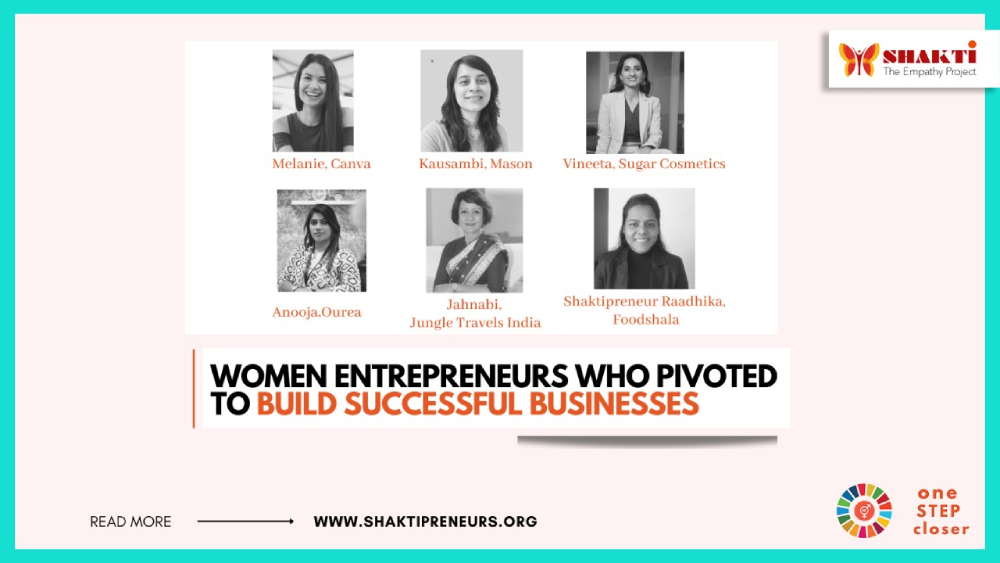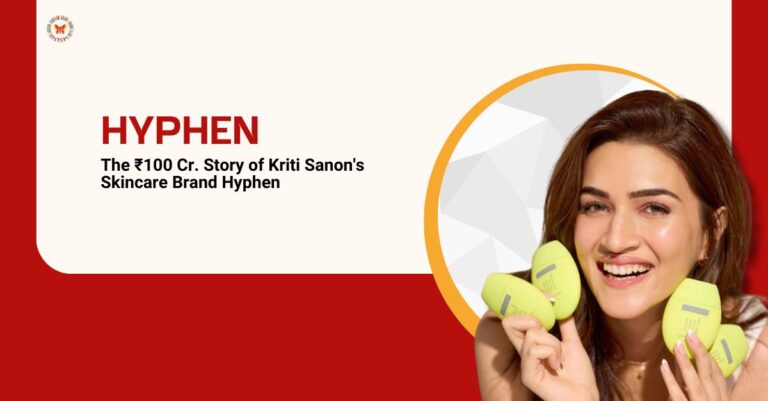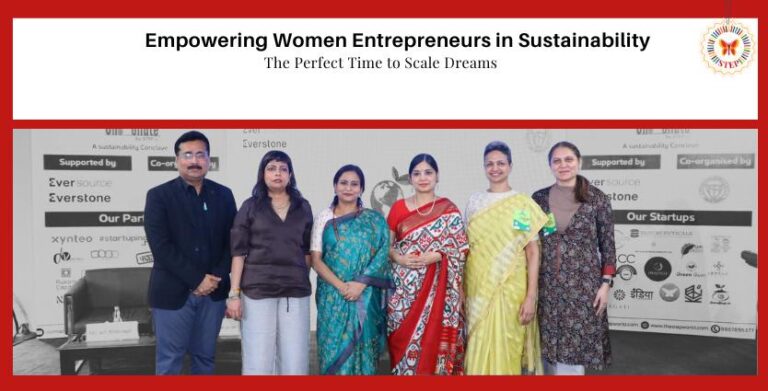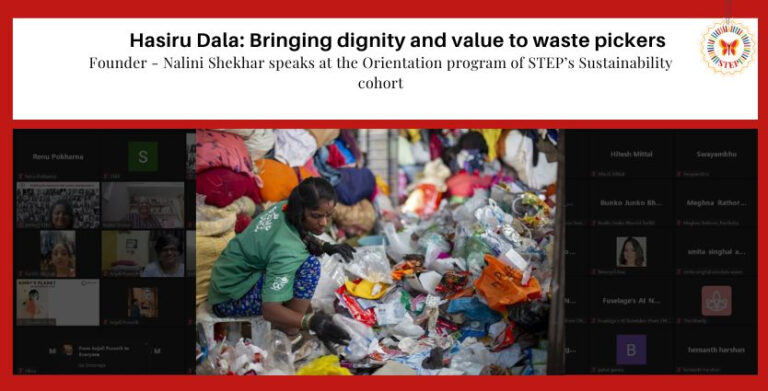Women entrepreneurs who pivoted to build successful businesses
Instagram wasn’t always Instagram as we know it —It began as Burbn, a check-in app that included gaming elements from Mafia Wars and a photo element. The creators worried Burbn had too much clutter and would never gain traction. They rebuilt a version of the app that focused solely on photography—it was clean and easy to use, and their strategy paid off.
The most critical decision for an entrepreneur is to decide when to stay the course vs. change direction, but if the conditions favor change, it should be done.
Here, we showcase some women entrepreneurs who pivoted their startups to build successful businesses:
Melanie Perkins: Canva
Melanie and her co-founder began Canva as Fusion Books-a yearbook design business for schools. She offered templates, layouts, fonts, and elements to create yearbooks. They started with 16 schools in the first year.
The business was a success, but Perkins saw a bigger and more immediate need to create a one-stop shop for people who needed design services but did not have design skills. She began pitching to small investors, and the idea for Canva became a reality in 2012.
Today, Canva has grown into a global juggernaut. The company provides a graphic design platform allowing users to create social media graphics, presentations, posters, and other visual content. It is accessible on the web and mobile and integrates a library of stock photographs, fonts, templates, and illustrations.
Twenty million-plus users from 190 countries use the company’s web-based app to design everything from comic strips to elegant restaurant menus. Canva’s key advantage over rival products has been its ease of use.
“While every step of the way has challenges, that’s one of the best things about starting a company. The most important thing is to get started.”
Melanie Perkins
Kausambi Manjita: Mason
After working in Myntra and Paytm, Kausambi gained experience in building e-commerce enablement platforms and helping B2B teams succeed and grow faster.
She co-founded Kubric i.o.in 2018, a SaaS business that enabled video automation at scale for content creation in teams to help enterprises in Asia like Myntra, Flipkart, Swiggy, Amazon, and Dunzo. The venture was another runaway success that continued until early 2020.
From mid-2018 to 2019, Manjita traveled to Toronto and encountered many brands & business owners who used Shopify to sell their products. When she interacted with them, she realized that they were facing issues similar to the big brands, but the way they were experiencing it was different.
Her vision was always to democratize technology and bring it to everybody, and though Kubic was doing good and making money with big brands on board, she felt the founder GTM was not there.
She pivoted to Mason- designed around the needs of a well-established, medium-sized presumer (pre-consumer) business that has found its product-market fit.
Mason’s automation tools help integrate various subsystems of an e-commerce business, including inventory, pricing, customer engagement, marketing, and visual design, and aim to ensure product availability gets communicated to the customer. The freemium business model lets low-volume businesses avail of premium services for as low as $9 (roughly Rs. 650) per month.
Mason has helped over 30,000 brands automate their business funnel since its inception.
“We discussed and realized we felt more connected to a lot of people v/s continuing to work with big brands, who were already doing a great job. It was more about optimization for big brands, but it was about independence and life & death for the masses. We chose the latter; Mason was born!”
Kausambi Manjita
Vineeta Singh: Sugar Cosmetics
After graduating from IIT-Madras and IIM-Ahmedabad, Vineeta ditched an “Rs.1 crore” job offer from a leading investment bank to dive into entrepreneurship.
Quetzal, a background verification service for recruiters, which Singh founded in 2007, was a “spectacular failure”.
Vineeta was passionate about building a consumer business for women. In 2012, e-commerce in India was firing up, and women increasingly had access to disposable income.
Singh started Fab Bag, a subscription business that offered women an assortment of beauty products every month for a small fee. She ran this for nine years and amassed 200,000 customers. The close-knit community of women shared their preferences, skin problems, and dislikes with Singh.
As she gleaned through the data, she realized that available makeup brands —foreign or local did not cater to Indian skin tones or the Indian way of life.
Singh started Sugar Cosmetics in 2015 with these insights. The team used YouTube, Instagram, and Sugar’s app to reach out to customers.
In the financial year 2021, the revenue from sales of goods amounted to 1.2 billion Indian rupees. Vineeta came into the limelight recently for becoming one of the sharks in Shark Tank India.
“Failures happen, and life isn’t always sweet, but if you work hard enough and don’t give up when you’re down, you just might be able to find your SUGAR.”
Vineeta Singh
Anooja Bashir: Ourea
After living and working in Dubai as a civil engineer for over a decade, Anooja returned to her hometown, Kochi, in 2013 with entrepreneurial dreams. She came up with LIKES- Learning Innovative Key Employment Skills, a skill development program along the lines of a finishing school for professionals. Her venture was called Ourea.
While she had the expertise to run the finishing school, she lacked the entrepreneurship skills and resources to go about it and lost her investment.
It took Anooja four years to rebuild her dream. In 2017, she re-registered Ourea and fashioned it as a marketing venture. This time, it started helping companies gain a foothold by adopting the right marketing strategies. She won a project with an online cab service, but the client had some payment issues. She incurred huge financial losses when the liability fell on her.
At the end of 2018, she developed Ourea into a 360-degree company. The company provides industrial training, business mentoring, and coaching to small and medium enterprises and startups.
They develop the most appropriate strategies for a brand’s growth and development.
Ourea uses designs and videos to attract the right
audience and updates its website and social media sites to ensure one-to-one customer interaction. They create content that consciously or unconsciously connects brands to the customers.
Ourea’s team has experts from various sectors- talented and skilled marketers, strategists, graphic designers, developers, account managers, and system administrators.
Ourea has managed to help more than 60 brands to start up from scratch and to revolutionize existing establishments by giving such enterprises a thorough facelift.
“My advice to other young women is-never give up, no matter what.”
Anooja Bashir
Jahnabi Phookan: Jungle Travels India
Jahnabi set up JTI as a travel agency in 1989. She realized that traveling was a seasonal business and turned to air ticketing, in which they became quite successful. JTI became the first IATA agent from the Northeast after American Express chose it as their representative in 1996.
Eventually, she realized the potential of tourism in Northeast India and pivoted into the business of resorts.
JTI leased a 16-roomed lodge from the Assam government in Manas National Park, a UNESCO World Heritage site, and developed it into Bansbari Lodge. In 2008, they opened the upscale Diphlu River Lodge in Kaziranga National Park, judged as the second-best Wildlife Resort in the country. It came into the limelight when the Duke and Duchess of Cambridge stayed there during their visit to India in 2016.
Jahnabi pioneered long-distance river cruising in India with unique cruises on the Brahmaputra river in Assam and Ganges and was awarded the Indian National Tourism Award for Innovation for this pioneering venture.
“Look beyond your business and see new horizons as new horizons lead to new business opportunities.”
Jahnabi Phookan
Shaktipreneur Raadhika Gupta: Foodshaala Foundation
Shaktipreneur Raadhika started Foodshaala Foundation to set up community kitchens that served daily nutritious meals to more than 1,500 children from low-income communities in the Gurugram district, employing local women from the communities and training them to cook.
Foodshaala provided thousands of meals and ration packets, especially during the pandemic, but had to shut down their community kitchens.
Raadhika realized that rather than serving meals, it would be more impactful if people within the communities learned to prepare them.
Foodshaala started a program to create nutrition Awareness in schools, providing children with appropriate knowledge about nutrition in a practical manner to enable them to apply the course content to their daily life.
Foodshaala also does awareness and behavior change programs on food and nutrition by running the program for children from low-income communities from classes 6 to 8.
Their program consists of six workshops. These workshops cover topics like macronutrients, micronutrients, diet diversity, how to read food labels, and harm caused by junk food. The program module also includes practical sessions where children plan what goes on their plates.
Expert nutritionists from Foodshaala develop recipes and the curriculum for the awareness sessions. Foodshaala was awarded the prestigious Nutrition Award 2022 by the World Food Programme, Glenmark Foundation, and Idobro.
“Our nutrition awareness program has led to significant improvements in knowledge, attitude, and behavior of children towards healthy eating, increase in diet diversity, and reduction in consumption of junk food.”
Raadhika Gupta



